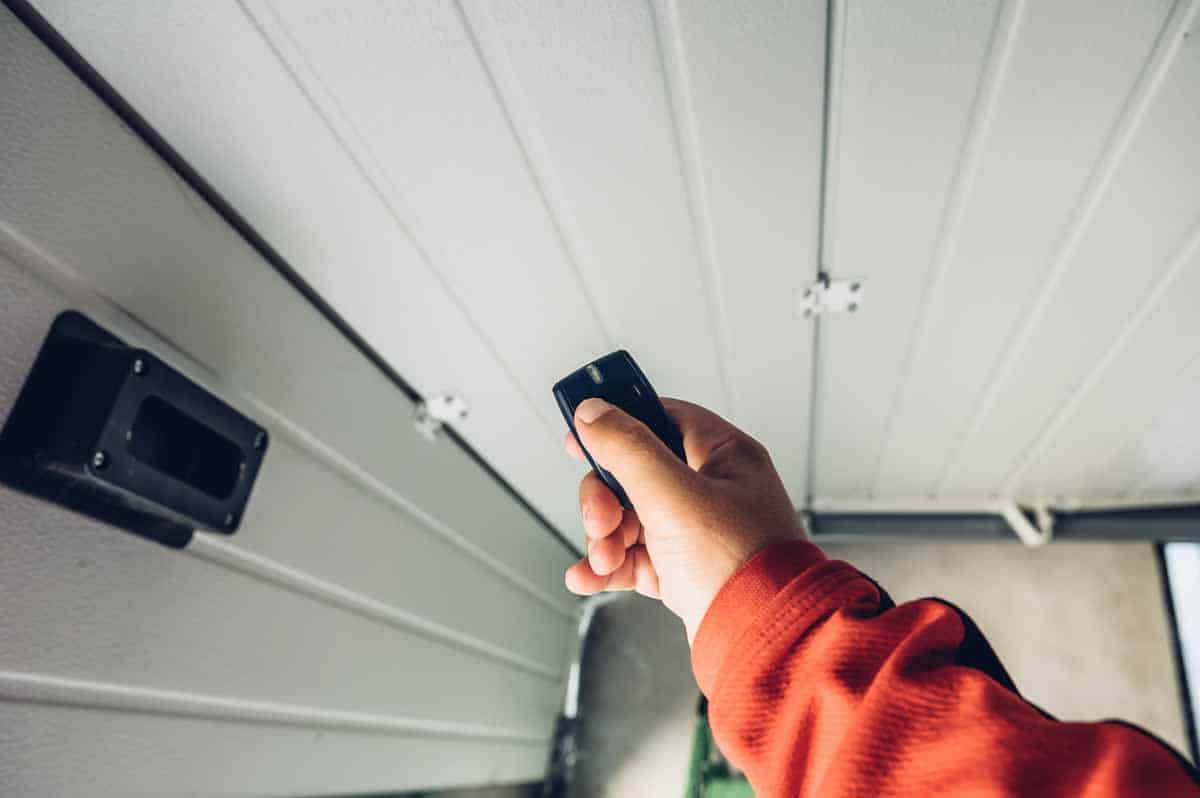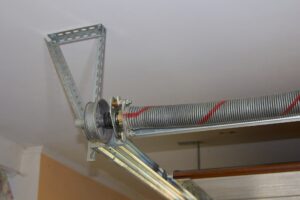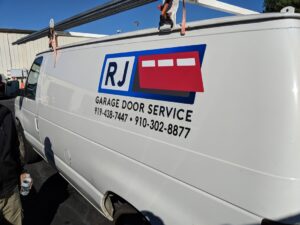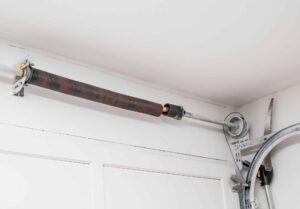Topics Covered:
Here at RJ Garage Door Services in Raleigh, we’ve seen our fair share of garage door springs on the brink of failure. These small but mighty components might seem insignificant, yet they shoulder an enormous responsibility. If a garage door spring is worn, damaged, or about to snap, it can create an unexpected and potentially dangerous situation. That’s why we believe it’s essential for every homeowner to know the red flags. In this article, we’ll walk you through five warning signs your garage door springs are failing and what you can do about it—so you can stay safe, save money, and keep your garage door running smoothly.
Why Springs Matter So Much
Your garage door likely weighs hundreds of pounds, and the springs bear the brunt of that weight. These springs make it possible for the door to open and close with minimal effort, whether you’re using an automatic opener or manually lifting the door. If you’re in Raleigh—where busy schedules and car-centric lifestyles are the norm—a garage door failure can be a big disruption. Beyond the inconvenience, though, is the safety aspect: broken springs can snap with enormous force, potentially causing injury or damage to property. Fortunately, by learning to spot a few telltale signs of failing springs, you’ll reduce your risk and know when to call in the professionals.
1. Unusual Noises During Operation
Let’s face it, all garage doors make noise—especially if you live in a humid climate like Raleigh’s, where metal components can easily rust if not well-maintained. However, a door with springs on their last legs often emits sounds that stand out from the usual hum and rattle. High-pitched squeaking or loud popping noises can indicate the springs are wearing down.
What to Do: If you notice new or increasingly loud noises every time you open or close the door, don’t just turn up the TV to drown them out! Instead, lubricate the springs with a silicone-based lubricant (avoid WD-40 for springs, as it can remove necessary grease). If the noises persist after lubrication, it’s time to contact us at RJ Garage Door Services for a thorough inspection. Addressing the issue early can prevent the springs from snapping or causing more damage to other parts of the door system.
2. Your Door Feels Heavier Than Usual
One of the most common comments we hear from customers is: “My garage door feels a lot heavier.” If you ever find yourself needing to open your door manually—maybe during a power outage—you’ll immediately notice this change. Springs that are losing their tension no longer counterbalance the door’s weight effectively. This added strain means you’ll likely have to tug harder or struggle to lift the door at all.
What to Do: If the door suddenly feels heavier than a typical load of groceries, it’s a warning sign you shouldn’t overlook. You may want to do a quick “balance test” by disconnecting the automatic opener and lifting the door halfway. If it doesn’t stay in place or if it slams shut, that’s a major indicator the springs are no longer doing their job. In this scenario, it’s best to call a professional. Garage door springs are under high tension, and DIY repairs can be dangerous—let us handle the heavy lifting.
3. Noticeable Gaps or Wear in the Springs
While it might seem obvious, many homeowners just don’t think to physically inspect their garage door springs until something goes wrong. But visual checks can reveal a lot. If you see any gaps between the coils—like if the spring looks stretched out or there’s a noticeable separation—that’s a clear sign your spring is past its prime. Also be on the lookout for rust, corrosion, or any visible wear and tear. Raleigh’s humid summers and occasional storms can accelerate corrosion, so it’s worth keeping a close eye on your springs.
What to Do: Make it a habit to glance at your springs every few months, or at least twice a year when you perform seasonal maintenance on your garage door. If you notice rust or any deformities, schedule an inspection. A quick visual check and timely professional intervention can save you from an unexpected spring snap, which can cause the door to drop suddenly.
4. The Door Isn’t Opening Smoothly
A properly functioning garage door should move up and down in a relatively smooth motion. If you notice jerky movements, stuttering, or the door struggling to reach its fully open position, that’s a big red flag for failing springs. In some cases, the door might only lift a few inches off the ground before slamming shut again. While there could be other culprits—like damaged tracks or a worn-out opener—old or faulty springs are a prime suspect.
What to Do: If the door is refusing to open smoothly, don’t try to force it. Continuing to operate a door with failing springs can result in further damage or even a total failure. Instead, unplug the opener if you suspect the springs are compromised and get in touch with us immediately. We’ll figure out whether it’s a spring issue or something else causing the instability.
5. A Crooked or Uneven Door
Sometimes, only one of the two torsion springs or one side of the extension springs fails, leading to an imbalance in the garage door. The door might look tilted, or you’ll see one side is slightly lower than the other. If you notice this, it’s almost certainly a spring issue and needs prompt attention to avoid more extensive damage—such as warped tracks or damage to the door panels.
What to Do: Even if the door still opens and closes (with some extra noise and shaking), do not delay in calling a professional. An uneven garage door is a sign the spring system is compromised, and forcing it to operate can lead to costly structural damage. Our RJ Garage Door Services team in Raleigh can quickly diagnose the situation and recommend the safest, most cost-effective solution.
What Happens If You Ignore the Warning Signs?
We understand that life gets busy, and calling for a garage door inspection might not be at the top of your to-do list. But ignoring failing springs can lead to:
- Sudden Breakage: Springs can snap unexpectedly, causing the door to drop. This can be extremely dangerous if someone or something is underneath.
- Inconvenience: A broken garage door can trap your car inside or leave your home vulnerable if the door can’t fully close.
- Higher Repair Costs: A broken spring can damage other components—like the cables or the opener—leading to more extensive and costly repairs.
- Injury Risks: Garage doors weigh hundreds of pounds; a failing spring can put people and pets at risk if the door slams shut unexpectedly.
Given these potential hazards, it’s clear that spotting the warning signs early can save you trouble—and money—in the long run.
Steps to Take When You Spot Spring Issues
If you suspect your garage door springs are failing, here’s our recommended course of action:
- Stop Using the Door: Prevent further damage or injury by discontinuing use until you can get a professional assessment.
- Inspect for Visible Damage: If you can do so safely, take a look at the springs to confirm any obvious wear, gaps, or corrosion.
- Call a Professional: Springs are under high tension—this is not a DIY project. Professional repair is crucial for safety. Our team at RJ Garage Door Services has the tools and training needed to handle springs of all types.
- Schedule Repairs Promptly: Don’t wait—get repairs on the books as soon as possible to avoid further issues.
Addressing these signs promptly can make all the difference in maintaining a safe, operational garage door.
How Our Team at RJ Garage Door Services Can Help
As a local Raleigh-based company, RJ Garage Door Services is dedicated to keeping your garage doors in tip-top shape. Whether you need a same-day emergency spring replacement or a routine tune-up, our technicians bring both skill and a friendly approach to every job. In addition to fixing your springs, we can:
- Perform a full safety inspection of your door’s components.
- Replace worn cables, rollers, and bearings as needed.
- Offer advice on proper maintenance schedules, so you can prevent future spring failures.
- Help you choose the best quality springs for Raleigh’s climate, which experiences both hot summers and cooler winters.
We treat your garage door like it’s our own. After all, as Raleigh residents, we know how vital a reliable garage door is to your daily routine and peace of mind.
Maintenance Tips to Prevent Spring Failure
While no spring lasts forever—most torsion springs have a typical lifespan of about 10,000 cycles—regular maintenance can extend that lifespan and help you catch problems early. Here are a few essential tips:
- Lubricate Moving Parts: Use a silicone-based lubricant on the springs, rollers, and hinges at least twice a year. Proper lubrication reduces friction and helps prevent rust.
- Schedule Yearly Inspections: Even if everything seems fine, a professional tune-up once a year can catch minor issues before they become major problems.
- Keep the Tracks Clean: Debris, dirt, or small objects in the tracks can stress the springs as the door struggles to move smoothly.
- Watch Your Door’s Behavior: If the door starts opening slower, making unusual noises, or feels heavier, don’t ignore it—investigate right away.
- Consider Upgrading to Higher-Cycle Springs: For homeowners who frequently use their garage door, high-cycle springs can provide a longer lifespan and more durability in the face of constant use.
Raleigh Weather Considerations
You might be wondering what Raleigh’s climate has to do with your garage door springs. Surprisingly, temperature fluctuations and moisture can accelerate wear and tear. Springs may contract in cold weather and expand in hot weather, leading to micro-cracks over time. Humidity can lead to rust and corrosion. That’s why investing in high-quality, rust-resistant springs is especially important if you live here. Our team can recommend the best options that align with your budget and your door’s specific requirements.
Additionally, storms are not uncommon in our area. A well-maintained door with strong springs stands a better chance of holding up against high winds or debris during a storm. In severe weather, a door that’s in less-than-ideal condition can become a liability, potentially letting in water or even blowing open under pressure. Stay ahead of storm season by making sure your springs (and the rest of your garage door system) are in prime condition.
Wrapping It Up: Stay Safe and Avoid Costly Repairs
As you can see, your garage door springs play a crucial role in keeping your home safe, secure, and functional. By learning to recognize the signs of failing springs—unusual noises, increased door weight, visible wear, jerky movement, and uneven alignment—you can act promptly and potentially avoid dangerous situations. Regular inspections and maintenance go a long way in preventing sudden spring failure.
Remember, when it comes to spring repair or replacement, DIY jobs can be risky. The high tension in these springs can cause serious injury if they’re mishandled. That’s why calling in a professional is not just a matter of convenience; it’s a matter of safety. Our team at RJ Garage Door Services in Raleigh is ready to help you with any concerns you may have about your garage door springs—no matter how big or small. Give us a call, and we’ll make sure your door is back in action in no time.
Thanks for reading, and we hope this guide helps you spot warning signs before they escalate. Your garage door is a vital part of your home, and it deserves the same care and attention you give to any other major home system. From all of us at RJ Garage Door Services, stay safe, stay proactive, and enjoy the peace of mind that comes with a reliable, well-maintained garage door.




